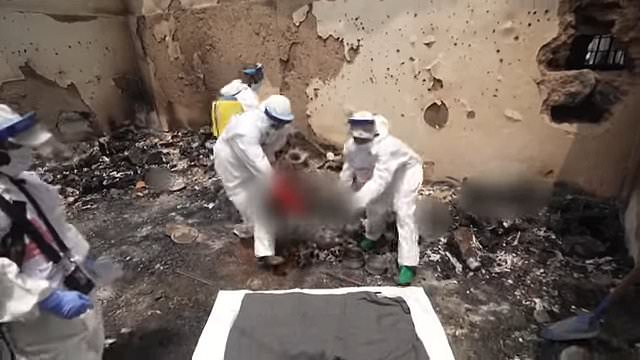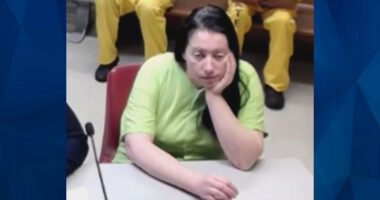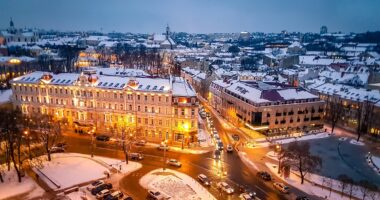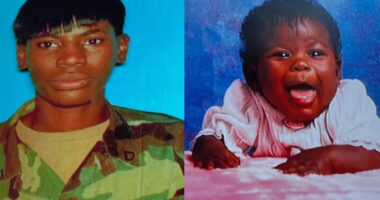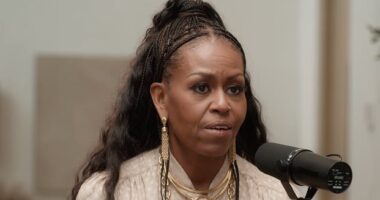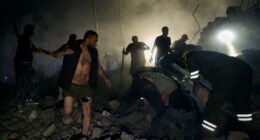
A disturbing new video has emerged showing burned bodies inside a women’s prison block in the Democratic Republic of the Congo where numerous women were sexually assaulted and then set on fire.
This gruesome event occurred when a large-scale jailbreak occurred at the Munzenze prison in late January, amidst violent clashes between M23 fighters and the Congolese army.
Reports from the UN reveal that female prisoners in their section of the severely crowded prison were brutally attacked by men who forcibly entered the area and carried out a savage spree of violence.
While thousands of male criminals managed to flee, the area reserved for women was torched to the ground, Vivian van de Perre, the deputy head of the UN peacekeeping force in Goma, said.
Now, a Channel 4 news team documented the horrific aftermath as the Red Cross undertook work to carefully remove the desecrated bodies.
The crew filmed on as aid workers clad in white PPE methodically put bodies into bags for further investigation.
With them was a grieving woman, Keren Mwami, who tragically stumbled upon a loved ones’ remains.
‘I’m sure my mother and sister’s bodies are here. I’ve checked the morgue and the churches, and they’re not there’, the woman told Red Cross workers as she walked into the room.
One worker said in response: ‘Have a look, we are taking them all outside.’
After looking around for just a second, she appeared to find her sister’s body.
Quietly, she said: ‘This is my sister. You can see her braids.’
Keren told Channel 4: ‘I was here on Monday, a week before. My mum braided [my sister’s] hair like that. I have nothing to do. I’m just on my own now.’
The broadcaster also spoke to one woman who managed to escape the prison as it was being set alight, though not without suffering severe burns across her body.
The woman, whose identity was withheld, said: ‘During the night, as we were sleeping I heard a sound and then saw fire coming from the ceiling. I shouted ‘I’m going to die here’.’
Channel 4 reported that the woman’s two-year-old baby died in the fire.
‘I saw the fire fall on her head. She was killed where she was sleeping. She was not alone, many children were burned. The number of children in that prison was 124.’
Vivian van de Perre, the deputy head of the UN peacekeeping force in Goma, previously said: ‘There was a major prison breakout of 4,000 escaped prisoners.
‘A few hundred women were also in that prison… They were all raped and then they set fire to the women’s wing. They all died afterwards.’
Local reports claim that during the mayhem, inmates were gunned down by guards as they attempted to stop the mass break out.
It comes as an uneasy calm was held on the Democratic Republic of Congo’s eastern front after regional powers dreading a wider war urged Congolese and pro-Rwandan forces to agree to a ceasefire.
In recent months the Rwandan-backed M23 Movement has swiftly seized scores of territory in the DRC’s mineral-rich east in fighting that has killed thousands and forced vast numbers to flee their homes.
Fearing the conflict would spill over into neighbouring countries, east and southern African leaders at a summit on Saturday urged an ‘immediate and unconditional’ ceasefire within five days.
Rwandan President Paul Kagame and his Congolese counterpart Felix Tshisekedi took part, Tshisekedi via video link.
In Bukavu, capital of South Kivu province, which is in the M23’s sights, locals expressed doubts that the summit would lead to lasting peace.
‘If the agreements are really respected, I can hope for a solution to the security crisis, but only if Kagame and his counterpart Tshisekedi meet and talk to each other without hypocrisy,’ Bukavu resident Heritier Zahinda told AFP.
The M23 offensive is the latest bloody chapter in the decades of violence that has torn apart the eastern DRC, driven by violence between various ethnic groups in the aftermath of the Rwandan genocide.
The DRC accuses Rwanda of coveting its vast resources of gold and mineral resources.
Kigali accuses Kinshasa of sheltering the FDLR, an armed group created by ethnic Hutus who massacred Tutsis during the 1994 genocide.
